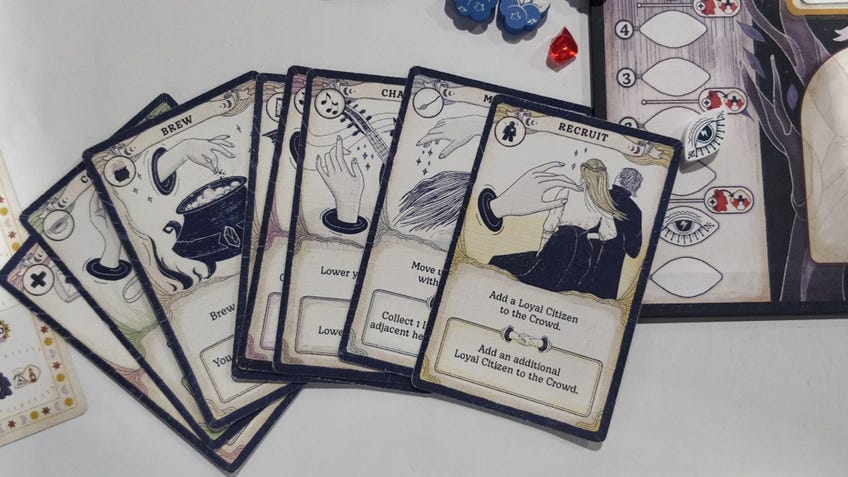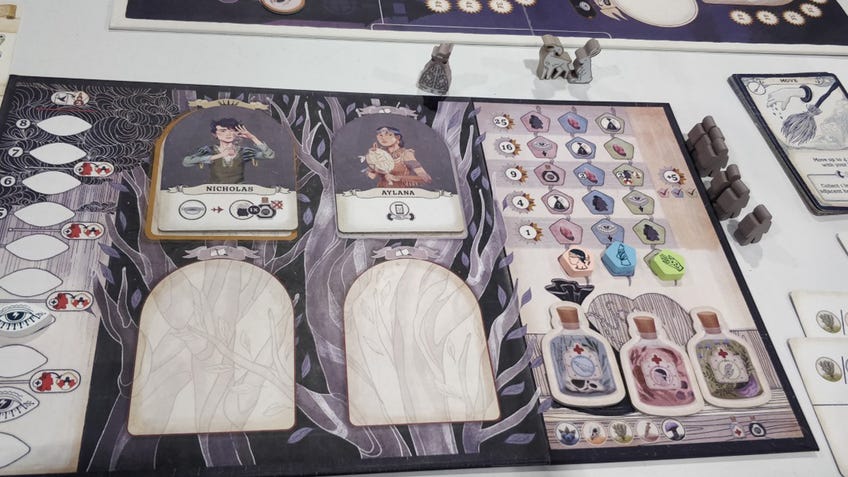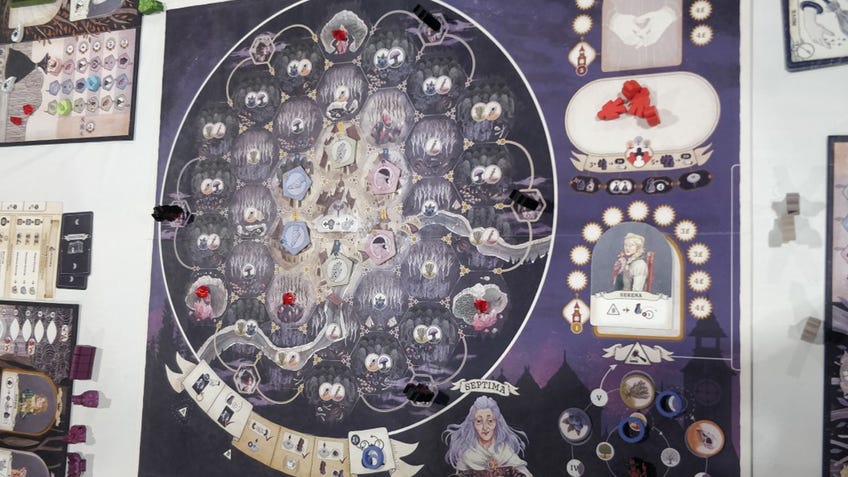Witchcraft board game Septima strikes a magical balance between cooperative and competitive
Cast a spell on you.
I spotted Septima on the very first day of PAX Unplugged 2022, the deep purple shade of its logo immediately catching my eye. Having covered the board game when its Kickstarter campaign launched back in June, I relished the opportunity to get my hands on a demo copy of Septima. My colleagues can attest to the fact that I was nagging them throughout the entire show to play Septima with me, and I certainly wasn’t the only one.
Septima is a board game about witch covens living within a community who have many false suspicions about the nature of witchcraft. The town of Noctenburg may be fictional, but there’s definitely some correlation to be made between its setting and the real-life history of witch persecution within medieval Europe. However, unlike many modern examples, which have a habit of sensationalising the violence done to those targeted by the witch trials, Septima is purely a board game about trying to lead a community in the face of ignorance and fear.

Players themselves are the leaders of their own specific covens and have ambitions to take the mantle of high witch in place of Septima, who is finally stepping down from her post. In order to prove themselves worthy of the position, the players need to display their leadership skills by managing their own covens over the course of four seasons, or rounds, with the most competent witch being awarded the role. Competency comes in many forms, from foraging ingredients to brewing potions to healing the sick.
Players will want to rescue their fellow witches because one, it’s the right thing to do, and two, because if they do then those witches will join their coven.
Variety really is the key to Septima as players won’t be able get away with going back to the same well when it comes to acquiring the victory points they need to win. Performing actions in Septima requires players to select a card from their hand, with each card being discarded until the end of each season. This means that players will need to think carefully about what they want to focus on each season. What makes Septima’s gameplay system so engaging is its dedication to player setup: that players will need to think ahead if they want to make any progress with their turns. Whilst it doesn’t make for a great demo that only lasts a single season, it has the potential to make for a delightfully rich board game.
Besides their own plans, players will also need to consider what they think their fellow coven leaders will be playing on that turn. Rather than choosing cards one at a time, players simultaneously select their cards in secret before revealing them and playing out their actions in turn order. This is important because players who choose the same action card as an opponent will be able to perform an additional action or obtain a bonus on top of the standard effect. Players are free to communicate what they plan to play on that turn if they want, thereby enabling them to synchronise their actions to get the most out of their cards. This adds a really interesting collaborative element to Septima, leaning into the game’s core themes of community over individual gain.
When brewed into a single game, the different ingredients of Septima make for a harmonious balance between the competitive and cooperative.
On the other hand, players will still have plenty of opportunities to work directly against their opponents in Septima thanks to its suspicion gameplay mechanic. Despite their efforts to heal sick citizens and protect the town, there are those who have axe to grind over the existence of witches in their area. These particular arseholes will cause trouble for the covens by sending out their witch-hunters to capture innocent witches and put them on trial. Once again, Septima is very tasteful when it comes to depicting the persecution of witches, choosing to subtly insinuate that witches who are found guilty suffer a bad fate rather than anything explicit. Nevertheless, players will want to rescue their fellow witches because one, it’s the right thing to do, and two, because if they do then those witches will join their coven.

Suspicion is raised whenever at least two players match in their actions on a turn, exchanging the additional power gained from working together for the eyes of bigoted townsfolk. This is where players can get mean with their action choices, choosing to deliberately pick the same card as someone else to raise suspicion against them. It says a lot of Septima’s thematic strength that this kind of strategy feels especially nasty, going against the ethos of community-first to spite another leader for your own gain. Though the player with the most loyal citizens in a trial will recruit a witch if they’re exonerated, the players still have work together to have even a chance of saving that witch.
Though I’ve only had a taste of what appears to be a complicated board game, I’m feeling pretty positive about Septima - and I haven’t even touched on the astonishingly beautiful artwork, which depicts witches with all sorts of gender and racial identities. When brewed into a single game, the different ingredients of Septima make for a harmonious balance between the competitive and cooperative – tasking players with getting more victory points than their opponents but encouraging them to do so for the good of the community.

